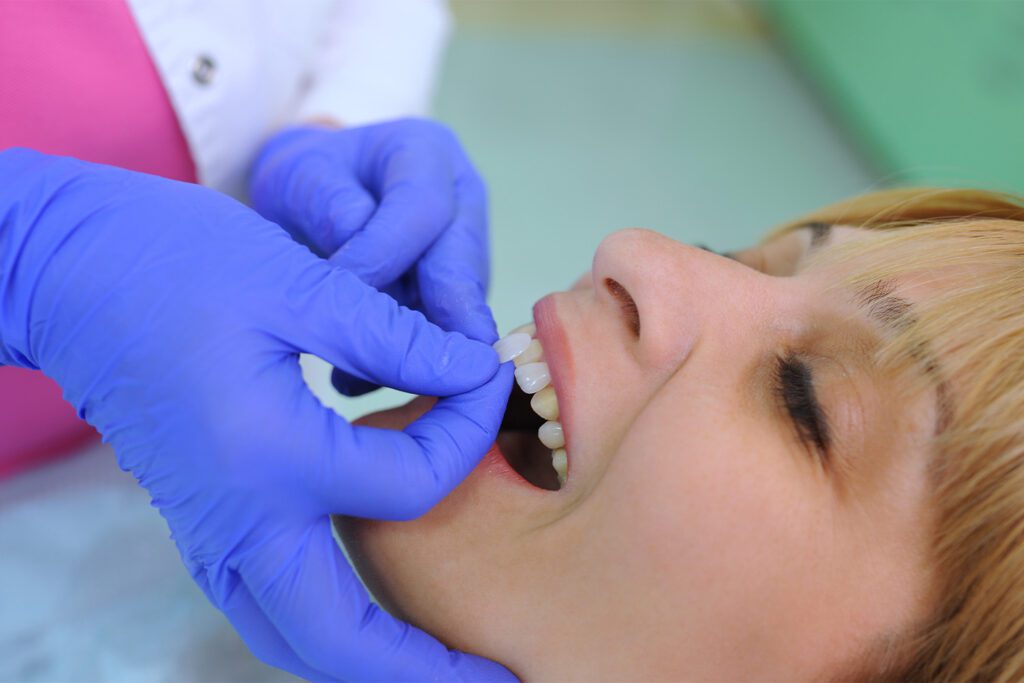Denture Implant Recovery Time-What to Expect
If you’ve made the decision to get implant-supported/ implant-retained dentures, congratulations — you’ve taken a massive step towards restoring your smile and bettering your life!
Soon, your smile will be stunning, but you’ve still got a few steps along the way and you’ll want to know what to expect for your denture implant recovery time.
Getting denture implants entails a surgery that, like any other, requires some recovery time that you can’t skip. It can be a little frustrating to wait, but we’re here to help you along the process.
Today, we’re going to talk about the nitty-gritty of implant-supported/implant-retained dentures. What does it feel like? How long will it take to recover from surgery? What are the next steps? If you want answers to all those questions and more, keep reading.

What Are Implant-Supported Dentures?
If you’re still fuzzy on the details of this denture technology, let’s take a second to fill you in before we get into the weeds.
Implant-supported/implant-retained dentures are dentures that anchor into your mouth using dental implants. The dental implants are anchored into your gums, and the dentures can snap on and off of the implants with ease, unlike other traditional dentures.
Why Should You Consider Implant-Supported Dentures?
It may seem like a hassle, but implant-supported/implant-retained dentures are an incredible medical technology that combines convenience with hygiene with quality.
The first reason to get them is that they offer a more secure fit than traditional denture options. We all know that overused trope in TV and movies where an older person is constantly struggling to keep their comically large dentures inside their mouths. With implant-supported/implant-retained dentures, you don’t have to worry about that fiction becoming a reality.
Because the dentures snap securely onto your implants, you don’t have to worry about them going anywhere unless you want them to. That means it’s easier to talk, chew tougher foods, enjoy intimacy and generally go about your day without having to use uncomfortable denture adhesives.
Another big reason to invest in implant-supported/implant-retained dentures is that they support your health in ways that traditional dentures cannot. Namely, they can help to prevent jaw bone loss.
When you have natural teeth, they’re embedded into the bone beneath your gums. When you chew, the pressure on your teeth stimulates that bone, strengthening it and helping it stay healthy. When you don’t have any natural teeth, this stimulation is no longer possible, which can cause the bone to degrade.
Jaw bone loss can be painful and can even cause your facial features to sink or sag — and it’s difficult to treat once it has already occurred.
The implants in your new implant-supported/implant-retained dentures anchor to that bone, which will give your jawbone the stimulation it needs to stay strong.
Recovery Time-What Should You Expect After Getting Denture Implants?
If you’ve gotten your consultation, received your scans, come up with a treatment plan, prepared your gums, and gotten dental implant surgery, you’re only a few steps away from having your implant-supported/implant-retained dentures.
Let’s talk about the key steps it takes to get healthy after surgery so you can start wearing your new teeth.
Rest: What To Expect on Day 3
First, you need to recover from your surgery for about a week or two. On day three after your surgery, your sedation and numbing will have worn off, and you’ll likely be experiencing some discomfort, pain, and swelling.
On the other hand, by day three, you should expect your swelling to start going down. Your healing process has begun, and it’s time to aid your body in getting back to normal.
To that end, you’ll generally need to avoid any foods that aren’t soft. Your teeth and gums aren’t ready to chew yet, so make sure you stick to soft foods and nutrient-rich beverages like juice, smoothies, mashed potatoes, applesauce, and other foods that don’t require much, if any, chewing.
It’s also a good idea to avoid any heavy exertion or exercise. Working yourself too hard could increase your blood pressure and cause the wound to get irritated or bleed.
You should also refrain from brushing the dental implant site for the first several days after surgery, and for at least a week. Doing so could cause bleeding and prevent your surgery site from healing properly.
Recovery: Healing Process
After about a week of rest, it’s time to start the recovery process. You’ll need to head back to your doctor for a follow-up so they can make sure that everything is healing properly. They’ll remove your stitches and answer any questions that may be pressing.
You can start eating soft foods like pasta or rice. Make sure you pace yourself — if it hurts to eat a certain food, avoid it. Give your body every chance to recover and heal well, and continue to avoid hard or crunchy foods.
As your surgery site heals, which should take about a week, you can start to gently brush the site of your implants. Make sure you use a very soft brush and do it gently to avoid aggravating the wound.
After about two weeks, you should be mostly healed. Your implants might be a little bit tender, but they should be nearly back to normal.
Routine: Strengthen and Practice
From there, it’s going to take four months for you to be ready for your final, anchored dentures. It takes time for your dental implants to bond and secure to your bone, and they need to be properly fused before you’re ready for dentures. The whole process will generally take four months. Sometimes additional healing is necessary. Don’t be frustrated.
In the meantime, you can start getting used to wearing dentures. Wearing dentures takes a bit of getting used to, as it can feel strange to have a piece of acrylic in your mouth at all times, even if it is where your teeth used to be.
You may have to slightly alter the way you talk or chew. You might bite your cheek and tongue a lot at first, and it takes practice to get used to your false teeth. Spend those next few weeks and months focusing on getting used to dentures.
The Final Process of Fitting the Prosthesis
Once the implants properly integrate with your bone, you’re ready to head back to your dentist to get your denture relined and attached to the implants. Your Dentist will get a proper reading of how your mouth, gums, and implants are shaped so they can reline and attach your dentures.
The last appointment, your Dentist can show you how to snap your dentures on and off your implants, and you’re ready to enjoy your beautiful, secure smile.
What Does Upkeep Entail for Implant-Supported Dentures?
Now that you’ve got your new dentures, it’s time to enjoy life and get into a rhythm with your new teeth. Just like natural teeth, your implant-supported dentures require daily care and cleaning to stay healthy and white.
Rinse After Eating
For starters, it’s a good idea to pop your dentures out after meals and give them a quick rinse to get rid of any food and debris that might have accumulated. This helps to keep your breath fresher and can go a long way toward preventing stains.
Nightly Cleaning
It’s also important to make sure you clean your dentures every night. Get a soft-bristled brush and a denture cleanser and give your dentures a nice scrub every night before bed. You’ll also want to brush your gums, tongue, and dental implants.
After brushing, your dentures need to stay moist to retain their shape, so you need to put them in a glass with some denture-soaking solution or just some plain water. This will go a long way in making sure your dentures last you for years to come.
Enjoy Your New Smile
And there you have it. Now you know everything you need to know about recovering after denture implant surgery and how to proceed with getting your new smile. As always, consult your doctor if you’re having any problems with your recovery.
For more information about implant-supported dentures, head to Renew Smiles.
Sources:
Dental Implant Recovery | UK Health Centre
Denture care: How do I clean dentures? | NCH Healthcare System
Implant Supported Dentures: Process, Benefits & Care | Cleveland Clinic
